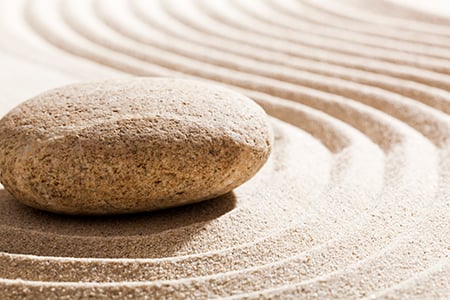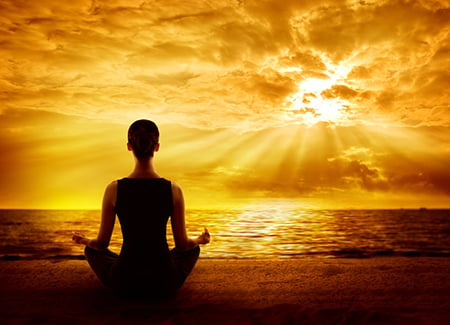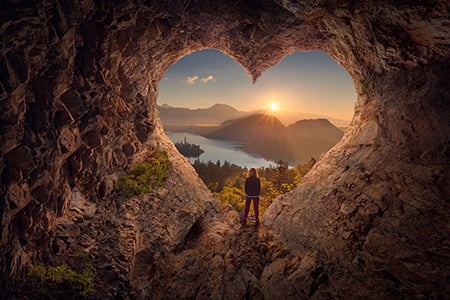Questions About Karma And Justice
Despite the knowledge that it’s completely impossible for us to avoid our bad karma, the Buddha did teach us a way that will minimize harm.
We want the world to make sense to us. We would like it to be fair and just. We want those we perceive as violators of norms and laws to be punished, and those we perceive as good, rewarded. We are unbalanced by the impersonality of the Universe, which makes it nearly impossible for us to consistently remember that it is not organized for the exclusive benefit of humans, and particularly not for ourselves.
Often, we can manifest very little control over issues we perceive as problematic or immoral. We can and should stand up (or as Buddhists we often sit zazen at protests) for what we believe is right, but we should also be on guard about drawing conclusions about the entire Universe based on our personal experiences. The alternative is to settle our minds at rest, as often as possible, in a calm, elastic, receptive state.
We can practice identifying and containing our own negative impulses and darker preoccupations of thought, because they precede and announce the future we will be inadvertently creating if we believe them. If we would inhabit a brighter future, we will need to clean up this moment’s thoughts, premises, beliefs, and impulses that precede and lay the foundation for it. Zazen is a karma-free practice, because in allowing everything to arise in the mind without censure within the discipline of our immovable posture, we allow the kinetic energy of our negative, shadow sides to work on emptiness, rendering them visible to us but harmless to others.
Monitoring our thoughts and feelings in the moment, interrogating the dark ones and trying to understand how they serve us, what narratives we’ve attached to them, and where in the body they appear to reside, builds confidence that we can manage them. Generosity and planting seeds of positive thoughts and intention is the moment-by-moment recipe for breaking the chains binding the future to the past.
I receive a lot of questions about karma and justice these days. Right now, in our country and every country on Earth, many cruel, unfair, and unjust events are unfolding. The Universe offers us an infinity of everything, so to some degree our perceptions of the world depend on what we examine most carefully. Everything is always available. There is an infinity of kindness, cruelty, betrayal, compassion, suffering, exaltation — all manifestations of the pregnant turmoil energy of the Universe. Everything exists in incalculable numbers, and all of it is empty of self.
Despite being old enough to know better than to expect life to be fair, nevertheless, when events like the murder of George Floyd or the calculated suppression of voters by gerrymandering or legal trickery arise, it is disturbing and raises the issue of how Zen practice might serve us in addressing such circumstances.
When a fox eats a rabbit, is it fair or unfair? When one set of people oppresses another, it doesn’t matter what our ideas about it are, the results are similar. This does not mean that we have to accept animal behavior as the “natural” standard of humans as some apologists for unregulated capitalism suggested during the 1970s. What distinguishes humans from the animal world, among other things, is our ability to control our instincts and behaviors that do not serve us.
Survival of the fittest as an economic theory was a philosophy guaranteed to please Wall Street and hedge-fund speculators but did not do much for the 99.9 percent of souls on Earth hauling the water, setting the bricks, or working in the Post Office. We are all on this Earth together. We are all playing roles consciously or unconsciously, interacting with one another, inventing our parts as we go within ancient, inherited scenarios that were designed by humans and can be redesigned by them.
Wealth is a measure of natural systems — fresh air, clean water, stable forests, safe neighborhoods, happy families, good relationships, fulfilling work. Riches pertain to what can be bought and sold. Unfortunately, the men and women populating our political institutions are forced to contend with the demands of the rich. We have allowed money to control our political system, and any objective observer will tell you that its power is absolute.
Our current state might be regarded as the karmic accumulation of a nation historically and presently consumed by the acquisition of material wealth. This has organized most of its past actions and decisions, from Imperialism to the Supreme Court’s assertion that political contributions are the equivalent of free speech. There are days when I feel that our fixation on material wealth has used up the near-total of our mental bandwidth. Whatever space is available for spiritual growth is the space required to question our dominant political paradigm. It is by that slender thread that the fate of democracy is suspended.
Recall the useful phrase hypocrisy is the tax that vice pays to virtue. When we know what’s good, but pursue a different path, we lie so that we’re not exposed as violating an accepted standard. In that way, even negatively, moral standards like the Ten Commandments or the Buddha’s precepts exert positive pressure on society. Whether we still have the time available to change course before incurring catastrophes remains an open question, but what are the alternatives?
I’ll share mine. One is meditation, the daily descent into formlessness is a refreshing bath for awareness. Meditation reaffirms the transitory nature of everything we refer to as reality. It makes our prizes and successes as transitory as our culpabilities. As we grow more familiar with what our minds generate, it eventually becomes incontrovertible that much of what we perceive as facts are internally generated feelings. Interrogating those feelings and analyzing their roots, causes, and consequences protect us from acting them out and generating negative consequences. While it seems a small step, remember there’s not much smaller than a grain of sand, yet multiplied billions of times, it becomes a beach.
We have the full potential of human beings inside of us, positive and negative, and when our attention lapses, we can be quite dangerous. I try to remind myself that I am often the problem I am trying to solve. Realistically, if we want the future to be different from the present, we have to change the present. We have to work on ourselves. We have to sit zazen.
Despite the knowledge that it’s completely impossible for us to avoid our bad karma, the Buddha did teach us a way that will minimize harm. That seems like enough to begin, doesn’t it?
Zen in the Vernacular by Peter Coyote © 2024 Inner Traditions. Printed with permission from the publisher Inner Traditions International. www.InnerTraditions.com
Peter Coyote is an award-winning actor, narrator and teacher. A Zen student since 1971, in 2011 he was ordained as a Zen Buddhist priest, and in 2015 received transmission from his teacher, making him an independent Zen teacher.
Find holistic Meditation Practitioners in the Spirit of Change online Alternative Health Directory.
RELATED ARTICLES:
Karma
Meditation Is More Than Silence and Emptiness











